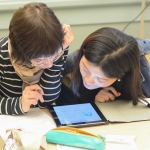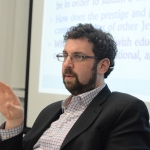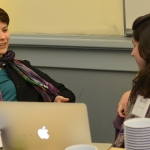American Jewish Education Inside and Outside the Box
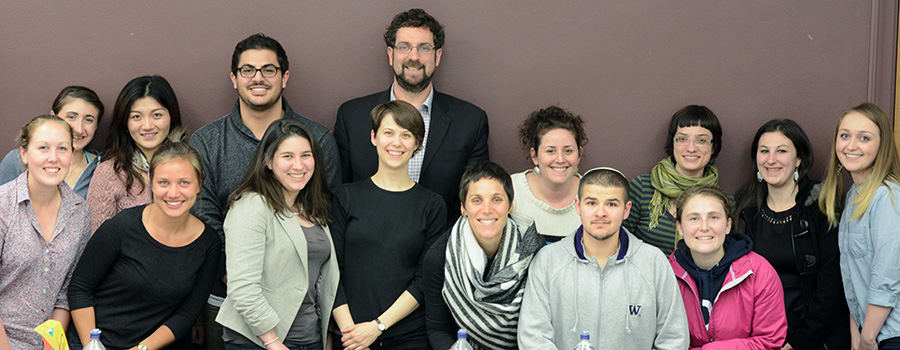
Led by Prof. Benjamin Jacobs (NYU) with Prof. Noam Pianko (UW)
Four Required Seminar Sessions
(2.5 hours each, includes dinner)
April 14, 2015: “Jewish Education Inside the Box”
6-8:30pm in Thomson 317
April 15, 2015: “Jewish Education Outside the Box”
6-8:30pm in Thomson 215
May 12, 1015: “Experiential Jewish Education”
6-8:30pm in Thomson 317
May 13, 2015: “Expanding Jewish Education”
6-8:30pm in Thomson 101
See all the 2015 Education Fellows photos on Flickr
About Prof. Benjamin Jacobs (Guest facilitator)
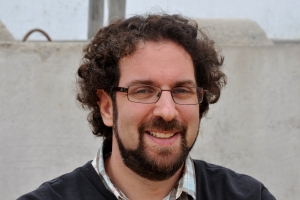 Benjamin M. Jacobs holds a joint position as assistant director of the Education and Jewish Studies program in the Department of Humanities and Social Sciences in the Professions and assistant professor of social studies education in the Department of Teaching and Learning. Among other areas, Jacobs’ research interests include social education, Jewish education, history of education, curriculum studies, teacher education, and education of ethnic groups. His publications include several studies of the history and theory of social education and Jewish education on the American scene.
Benjamin M. Jacobs holds a joint position as assistant director of the Education and Jewish Studies program in the Department of Humanities and Social Sciences in the Professions and assistant professor of social studies education in the Department of Teaching and Learning. Among other areas, Jacobs’ research interests include social education, Jewish education, history of education, curriculum studies, teacher education, and education of ethnic groups. His publications include several studies of the history and theory of social education and Jewish education on the American scene.
Jacobs received his Ph.D. from Teachers College, Columbia University, where he served as an instructor and supervisor in the social studies program from 2002-2005. He also served as adjunct instructor and program coordinator of the Education and Jewish Studies program at Steinhardt from 2000-2005, and assistant professor of social studies education at the University of Minnesota from 2005-2010. Prior to pursuing his doctorate, Jacobs taught history and social studies at a high school outside Washington, D.C.
Seminar Details
Session 1: Jewish Education Inside the Box
This session focuses on what Jewish education on the American scene in general, and in Seattle in particular, has looked like over the past number of years. We begin with an activity/discussion of “Jewish education inside/outside the box,” in which participants will be asked to bring two artifacts to the session, one representing ‘traditional’ and the other ‘newfangled’ Jewish education, and we will discuss the meaning and significance of these artifacts for Jewish education in the past and future. We then continue with a presentation/discussion on the historical purposes and ideals of Jewish education, culminating with an intensive focus on the case for Jewish education today. The remainder of the session is dedicated to understanding the landscape of Jewish identity and peoplehood in 21st century America, with a focus on recent demographic studies about the broader (Pew) and local (Seattle) Jewish communities as well as particular age cohorts (especially millennials). We are particularly concerned with the implications of these trends for Jewish educational activities. Finally, we discuss the characteristics, problems, and prospects of Jewish education initiatives in the Greater Seattle area.
Please bring two artifacts to the session, one representing to you ‘traditional’ Jewish education and the other ‘newfangled’ Jewish education.
Suggested Readings
Greenberg, A., & Berktold, J. (2006). “Grande Soy Vanilla Latte with Cinnamon, No Foam: Jewish Identity and Community in a Time of Unlimited Choices.” New York: Reboot. Read pp. 3-9, 11-20, 29-33. Skim the rest, per your interest.
Session 2: Jewish Education Outside the Box
This session focuses on new initiatives across the American Jewish educational landscape. We begin with a discussion that will broaden our common conceptions of Jewish education (schooling, camps, adult ed., etc.) to include various cultural, religious, political, and social institutions whose functions are educational even if their missions are not overtly focused on education. We then focus intensively on case studies of various start-up Jewish organizations that serve as models for creativity, entrepreneurialism, institutional and programmatic growth, and forward thinking. Finally, we contemplate our own stakes in the Jewish education enterprise and what transferable skills we have that we can put toward the improvement of Jewish education activities in accordance with the contemporary zeitgeist.
Suggested Readings
- Go to the website, type the word “education” into the search engine on the top of the page, and scroll through the headlines. Read 3 articles on issues of interest to you related to innovations in Jewish education (you may also do a focused search for these issues in the search engine; for example, do a search for “affordability” to find out about recent initiatives in Jewish education affordability). Be prepared to report out on your readings at our session.
Session 3: Experiential Jewish Education
In this session, we discuss the 5Ws + 1H (Who, What, Where, When, Why and How) of experiential Jewish education, which has been the focus of significant community attention and resources—strategic, logistical, and financial—over the past decade. We begin by exploring theories of experiential education (sometimes referred to as informal education) generally and consider their applications to Jewish education. We then home in on conventional venues for experiential Jewish education, such as summer camps, tourism, Israel trips, and service learning activities, to understand what aspects of these programs make them attractive to participants and stakeholders alike. Next, we explore a new venue for experiential Jewish learning—Jewish gaming—and contemplate its potential as a new wave for the future. Finally, we begin to sketch out a program for experiential Jewish education that might capture the attention of rank-and-file Jewish Gen Nexters.
Suggested Readings
Session 4: Expanding Jewish Education
For starters, we define the term “Jewish education” broadly to encompass matters related to the education, culture, and life of Jews. It includes both planned educational efforts directed at Jews, as well as educational patterns that emerge among Jews in their day-to-day lives, in informal and individual instantiations of knowledge acquisition and cultural performance that inhere across the American Jewish socio-cultural landscape. Following this expansive definition of Jewish education, we begin a reconceptualization of what it means to be a “Jewish educator.” Our premise is that opportunities for Jewish education need not occur in traditional Jewish spaces (synagogues, schools, camps, etc.) alone. The future of Jewish education is also in the day-to-day activities of Jews who seek diverse connections to Jewish life through a variety of on-ramps. With everyday Jewish educators constantly attuned to matters related to Jewish life, Jewish educational opportunities may arise in new, unexpected spaces. Our task in this session is to explore those opportunities and spaces.
Suggested Readings
Two Optional Lectures by Prof. Jacobs
Learn more about these lectures, and register to attend, at the Stroum Center Events page
April 16, 2015: “Jewish Education That Matters: Charting a Course for Generation Next”
7-9pm in Thomson 317
May 14, 2015: “What the Seattle and Pew Studies Tell Us—and Don’t Tell Us—about Jewish Education”
7-9pm in Thomson 317

